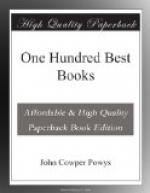9. Shakespeare. In the Temple edition.
It is time Shakespeare was read for the beauty of his poetry, and enjoyed without pedantry and with some imagination. The less usual and more cynical of his plays, such as Troilus, and Cressida, Measure for Measure and Timon of Athens, will be found to contain some very interesting commentaries upon life.
The Shakespearean attitude of mind is quite a definite and articulate one, and one that can be, by slow degrees, acquired, even by persons who are not cultivated or clever. It is an attitude “compounded of many simples,” and, like the melancholy of Jaques, it wraps us about “in a most humorous sadness.” But the essential secret of Shakespeare’s genius is best apprehended in the felicity of certain isolated passionate speeches, and in the magic of his songs.
10. Milton. Any edition.
No epicurean lover of the subtler delicacies in poetic rhythm or of the more exalted and translunar harmonies in the imaginative suggestiveness of words, can afford to leave Milton untouched. In sheer felicity of beauty—the beauty of suggestive words, each one carrying “a perfume in the mention,” and together, by their arrangement in relation to one another, conveying a thrill of absolute and final satisfaction—no poem in our language surpasses Lycidas, and only the fine great odes of John Keats approach or equal it.
There are passages, too, in Paradise Lost, Paradise Regained and Samson Agonistes, which, for calm, flowing, and immortal loveliness, are not surpassed in any poetry in the world.
Milton’s work witnesses to the value in art of what is ancient and traditional, but while he willingly uses every tradition of antiquity, he stamps all he writes with his own formidable image and superscription.
11. Sir Thomas Browne. Religio Medici and urn burial. In the “Scott Library” Series.
The very spirit of ancient Norwich, the mellowest and most historic of all English cities, breathes in these sumptuous and aromatic pages. After Lamb and Pater, both of whom loved him well, Browne is the subtlest adept in the recondite mysteries of rhythmic prose who can be enjoyed in our language. Not to catch the cadences of his peculiar music is to confess oneself deaf to the finer harmonies of words.
12. Goethe. Faust, translated in English Poetry by Bayard Taylor. Wilhelm Meister, in Carlyle’s translation. GOETHE’S CONVERSATIONS WITH ECKERMAN, translation in Bohn’s Library.
No other human name, except Da Vinci’s, carries the high associations of oracular and occult wisdom as far as Goethe’s does. He hears the voices of “the Mothers” more clearly than other men and in heathen loneliness he “builds up the pyramid of his existence.”
The deep authority of his formidable insight can be best enjoyed, not without little side-lights of a laconic irony, in the “Conversations”; while in Wilhelm Meister we learn to become adepts in the art of living in the Beautiful and True, in Faust that abysmal doubt as to the whole mad business of life is undermined with a craft equal to his own in the delineation and defeat of “the queer son of Chaos.”




